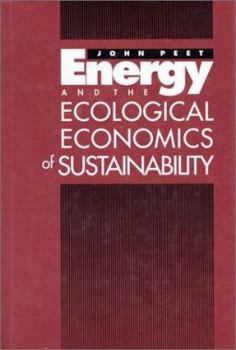Energy and the Ecological Economics of Sustainability
Energy and the Ecological Economics of Sustainability examines the roots of the present environmental crisis in the neoclassical economics upon which modern industrial society is based. The author explains that only when we view ourselves in the larger context of the global ecosystem and accept the physical limits to what is possible can sustainability be achieved.
Format:Paperback
Language:English
ISBN:1559631600
ISBN13:9781559631600
Release Date:May 1992
Publisher:Island Press
Length:327 Pages
Weight:1.05 lbs.
Dimensions:0.9" x 6.0" x 8.9"
Related Subjects
Biological Sciences Business Business & Finance Business & Investing Business Development Earth Sciences Ecology Economics Engineering Environmental Economics Environmental Science Environmental Studies Industries & Professions Natural Resources Nature Nature & Ecology Oil & Energy Science Science & Math Science & Scientists Science & TechnologyCustomer Reviews
2 ratings
Excellent introduction to the ecological economics paradigm
Published by Thriftbooks.com User , 25 years ago
For students wishing to get a grip ofthe ecological economics conception of the ecological-economic process, this boook is highly recommendable. Peet delivers an excellent discussion of some of the most revealing ecological economic criticisms of the conventional economics viewpoint. And most of all, this is done in a very curioussity provoking way, which off cause is a great recommodation for an introducory textbook.For folks already familiar with the ecological economics, the book will, although apleasure to read, not yield many unfamiliar insights. But the book provides an apt taxonomy of central ideas within the field.Lastly, a word forthe student which has already read this book, and wonders how to get deeper into the subject. For you I would strongly reccommend Nicholas Georgescu-Roegens (1971) classic "The entropy law and the economic problem," or to aslighter degree one of Herman Daly's books. Roegen's work has (as will be immediately appearent in Peets book) served as a major inspiration and pathbreaker in the development of the ecological economics. His work is, however, of a natural philosofhic content, which is NOT easily understood - but it is a true masterpeace.
Fantastic challenge to existing paradigm.
Published by Thriftbooks.com User , 25 years ago
This book may knock your scientific socks off. It is a cogent criticism of existing scientific perspectives, especially regarding classical economic theory.It is reasonable to assume that the environmental problems that have been created by our current economic practices are a reflection or the outcome of our current reductionist, deterministic (e.g. Newtonian) scientific paradigm. It is obvious that demonstrated success in mechanical physics is not a priori evidence that the tools are available to solve more complicated problems in natural and economic systems. (As an example, we can put a man on the moon, but why can't we feed the world?) Peet offers a new perspective -- the systems perspective -- as appropriate for the construction of new models of the natural and economic world.It is not surprising that economic theories dating back to Adam Smith and inspired by analogies with Newtonian mechanics (what might facetiously be called "Newtonian economics") should be found inadequate in the context of the systems perspective. Simply put, human behavior does not submit to the calculus of mechanical reasoning. If one accepts Peet's arguments (which are difficult to undermine), then it becomes clear that our most urgent research need is in establishing and articulating a new paradigm of scientific reasoning that offers hope for addressing the environmental problems of the present (and presumably the next two hundred years, give or take). Peet suggests that an "ecological view" is the proper basis for a new science called Ecological Economics.There is a wide and growing body of literature associated with Ecological Economics. Peet is only one spokesperson of the new paradigm, but he benefits from a background in chemical engineering that distinguishes his voice from those of the economists, ecologists and biologists that are also eminent in this new field. As such, the principle scientific underpinnings of his message are the laws of thermodynamics. Not the dreaded thermo endured by sophomore engineering students (e.g. heat engines and temperature-pressure diagrams), but a more accessible thermodynamics that offers a new perspective on familiar problems.This text should be required reading in engineering graduate programs everywhere. It is increasingly more difficult to do engineering in the narrow, puzzle-solving context of the late 20th century and the broader perspective provided herein is essential for solving the problems that have been left for us by previous generations.





